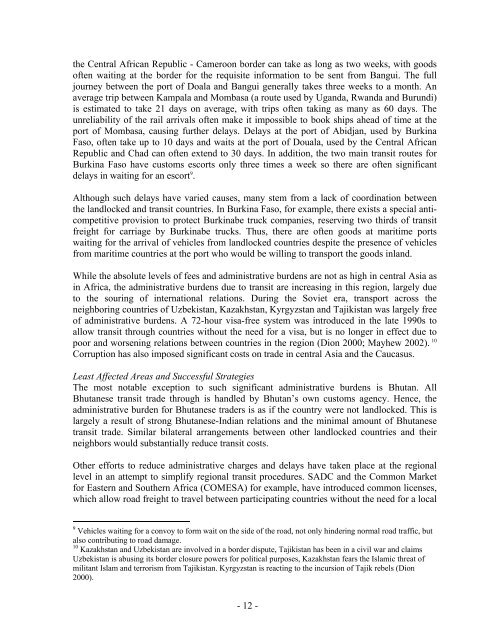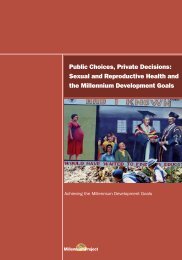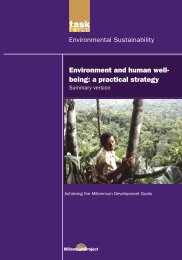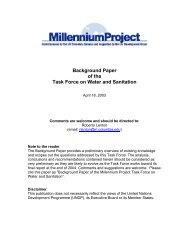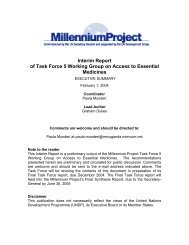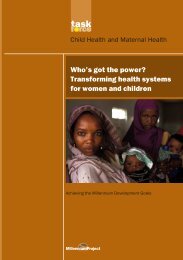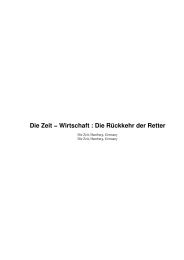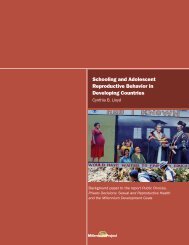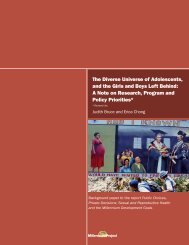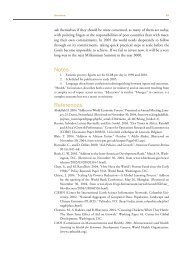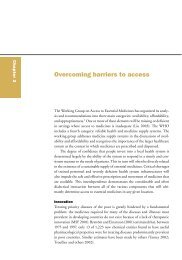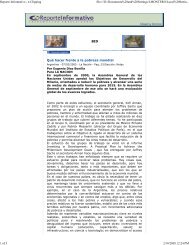the challenges facing landlocked developing countries: a case study ...
the challenges facing landlocked developing countries: a case study ...
the challenges facing landlocked developing countries: a case study ...
You also want an ePaper? Increase the reach of your titles
YUMPU automatically turns print PDFs into web optimized ePapers that Google loves.
<strong>the</strong> Central African Republic - Cameroon border can take as long as two weeks, with goods<br />
often waiting at <strong>the</strong> border for <strong>the</strong> requisite information to be sent from Bangui. The full<br />
journey between <strong>the</strong> port of Doala and Bangui generally takes three weeks to a month. An<br />
average trip between Kampala and Mombasa (a route used by Uganda, Rwanda and Burundi)<br />
is estimated to take 21 days on average, with trips often taking as many as 60 days. The<br />
unreliability of <strong>the</strong> rail arrivals often make it impossible to book ships ahead of time at <strong>the</strong><br />
port of Mombasa, causing fur<strong>the</strong>r delays. Delays at <strong>the</strong> port of Abidjan, used by Burkina<br />
Faso, often take up to 10 days and waits at <strong>the</strong> port of Douala, used by <strong>the</strong> Central African<br />
Republic and Chad can often extend to 30 days. In addition, <strong>the</strong> two main transit routes for<br />
Burkina Faso have customs escorts only three times a week so <strong>the</strong>re are often significant<br />
delays in waiting for an escort 9 .<br />
Although such delays have varied causes, many stem from a lack of coordination between<br />
<strong>the</strong> <strong>landlocked</strong> and transit <strong>countries</strong>. In Burkina Faso, for example, <strong>the</strong>re exists a special anticompetitive<br />
provision to protect Burkinabe truck companies, reserving two thirds of transit<br />
freight for carriage by Burkinabe trucks. Thus, <strong>the</strong>re are often goods at maritime ports<br />
waiting for <strong>the</strong> arrival of vehicles from <strong>landlocked</strong> <strong>countries</strong> despite <strong>the</strong> presence of vehicles<br />
from maritime <strong>countries</strong> at <strong>the</strong> port who would be willing to transport <strong>the</strong> goods inland.<br />
While <strong>the</strong> absolute levels of fees and administrative burdens are not as high in central Asia as<br />
in Africa, <strong>the</strong> administrative burdens due to transit are increasing in this region, largely due<br />
to <strong>the</strong> souring of international relations. During <strong>the</strong> Soviet era, transport across <strong>the</strong><br />
neighboring <strong>countries</strong> of Uzbekistan, Kazakhstan, Kyrgyzstan and Tajikistan was largely free<br />
of administrative burdens. A 72-hour visa-free system was introduced in <strong>the</strong> late 1990s to<br />
allow transit through <strong>countries</strong> without <strong>the</strong> need for a visa, but is no longer in effect due to<br />
poor and worsening relations between <strong>countries</strong> in <strong>the</strong> region (Dion 2000; Mayhew 2002). 10<br />
Corruption has also imposed significant costs on trade in central Asia and <strong>the</strong> Caucasus.<br />
Least Affected Areas and Successful Strategies<br />
The most notable exception to such significant administrative burdens is Bhutan. All<br />
Bhutanese transit trade through is handled by Bhutan’s own customs agency. Hence, <strong>the</strong><br />
administrative burden for Bhutanese traders is as if <strong>the</strong> country were not <strong>landlocked</strong>. This is<br />
largely a result of strong Bhutanese-Indian relations and <strong>the</strong> minimal amount of Bhutanese<br />
transit trade. Similar bilateral arrangements between o<strong>the</strong>r <strong>landlocked</strong> <strong>countries</strong> and <strong>the</strong>ir<br />
neighbors would substantially reduce transit costs.<br />
O<strong>the</strong>r efforts to reduce administrative charges and delays have taken place at <strong>the</strong> regional<br />
level in an attempt to simplify regional transit procedures. SADC and <strong>the</strong> Common Market<br />
for Eastern and Sou<strong>the</strong>rn Africa (COMESA) for example, have introduced common licenses,<br />
which allow road freight to travel between participating <strong>countries</strong> without <strong>the</strong> need for a local<br />
9 Vehicles waiting for a convoy to form wait on <strong>the</strong> side of <strong>the</strong> road, not only hindering normal road traffic, but<br />
also contributing to road damage.<br />
10 Kazakhstan and Uzbekistan are involved in a border dispute, Tajikistan has been in a civil war and claims<br />
Uzbekistan is abusing its border closure powers for political purposes, Kazakhstan fears <strong>the</strong> Islamic threat of<br />
militant Islam and terrorism from Tajikistan. Kyrgyzstan is reacting to <strong>the</strong> incursion of Tajik rebels (Dion<br />
2000).<br />
- 12 -


